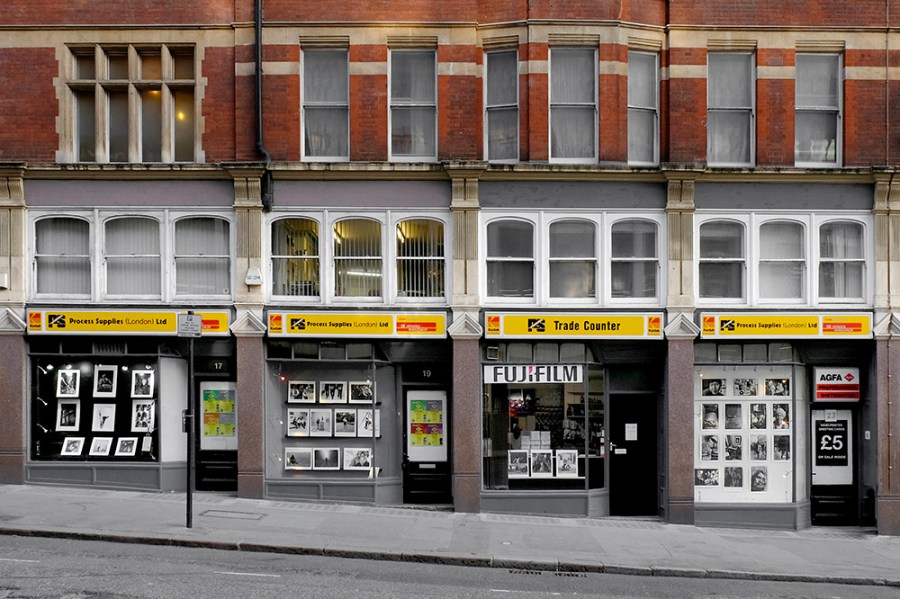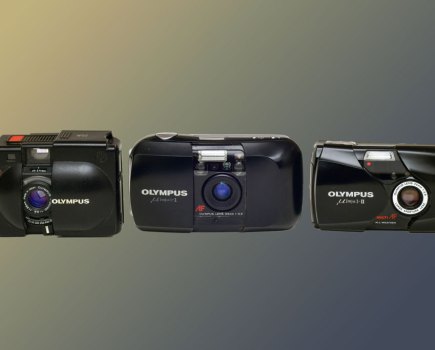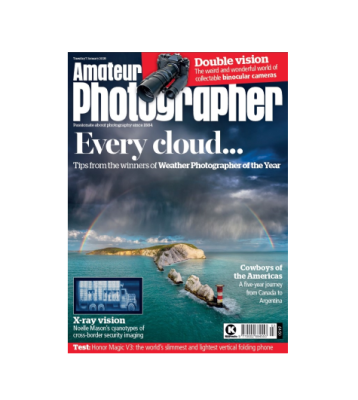For the latest in his series celebrating British photographic heritage, Mike Crawford tells the story of London-based Process Supplies
Previously in this series on British photographic heritage, I have looked at studios, societies and brands. However, I thought it would be fitting to also consider shops and retail, and in particular, a London business which has been owned by the same family for close to 100 years. I have been a customer at Process Supplies in Mount Pleasant, Clerkenwell, since the late 1980s. It stocks an extensive catalogue of photographic papers, films and chemistry in addition to digital papers and inks, archival storage materials and a comprehensive range of studio and darkroom essentials and accessories.
A family affair
I was interested to find out more about the shop’s history and how it has remained a family business for so long. I got the chance recently to sit down with the owners – brothers Neil and Paul Willes – in their local Clerkenwell pub to find out more. ‘We have always been in Mount Pleasant, with number 19 being the original premises,’ Neil told me. ‘Although we have expanded to neighbouring properties over the years, it’s still the same address.
Leonard Spencer opened the shop in 1928 and our father, Stanley Willes, became involved in 1930, though we don’t exactly know how that happened. Originally, the company was supplying photographic materials for the graphic arts trade such as chemicals and glass plates used for the production of printing plates for publications. Back then, Clerkenwell was the centre of the printing industry.’
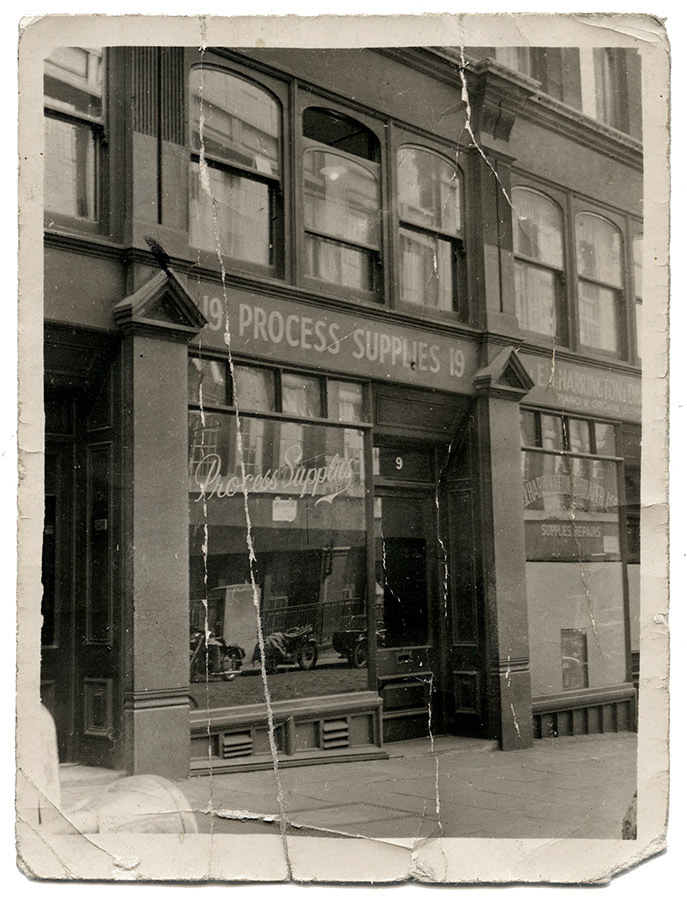
This snapshot from 1935 shows how little the frontage of the building (which is listed), has changed in nearly 100 years. Photo: Willes Family
Indeed, printers have been based in this area since at least the 16th century, producing books, journals, pamphlets and engravings with nearby Fleet Street becoming the home of the newspaper industry until the 1990s. Paul continued, recounting the changes to the business over the years. ‘Gradually the graphic arts side declined, but by then the customer base was more within the photographic industry. It certainly boomed in the 60s, the “David Bailey” era in London and has continued from there.’
‘I joined the company in 1976,’ added Neil, ‘just when it was really taking off on the photographic side. The location has been one of our blessings and being based in Clerkenwell was just the right place at the right time. We are situated between the West End and the City, and in the ’70s and ’80s there were so many photo studios and agencies nearby and Fleet Street just down the road. Before digital, we were supplying all the main newspapers which all had staff photographers and their own darkrooms.’
Neil emphasised the family’s involvement in the business. ‘There are seven of us, five brothers and two sisters; and over the years, nearly all of us have worked for the company. Rob, the second-oldest, left school at 15, joining in the 1960s – and is now retired after 50 or so years.’
Paul, who joined in 1983, added, ‘Our father carried on working till the ’90s, having worked for over 60 years. By then dad was well into his eighties, though was enjoying good holidays, flying round the world!’ In recent years, another family member, Chris Willes, has started working in the shop.
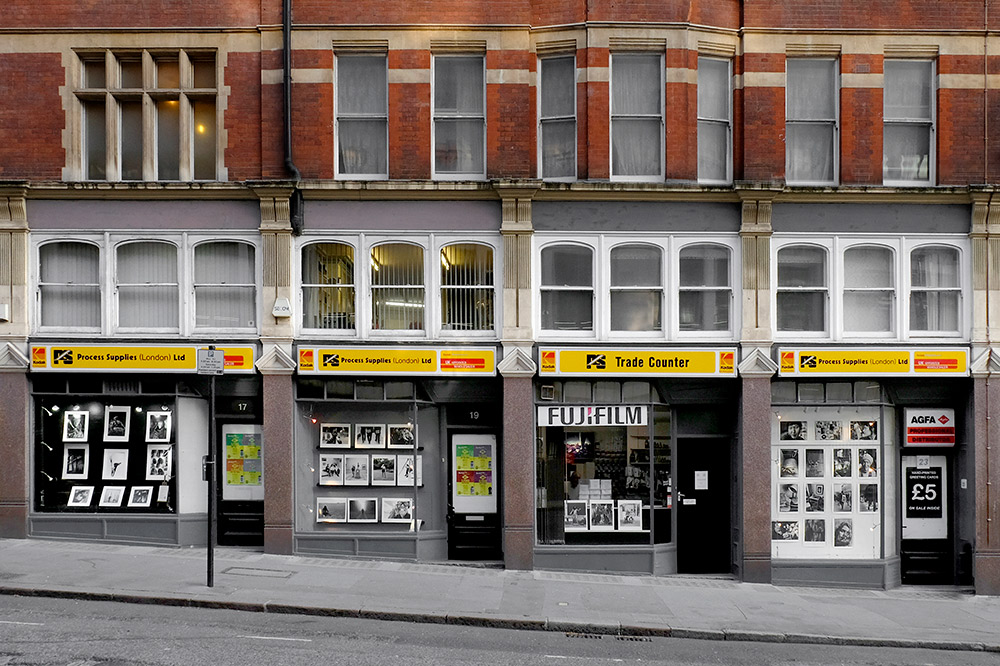
Over the years, Process Supplies has expanded from its initial shop at 19 Mount Pleasant to adjoining properties, with much of its stock held in the basements below. Photo: Mike Crawford
Black & white specialists
Although they have always sold a wide range of photographic products, equipment and accessories, they are known for their specialisation in traditional black & white materials. ‘I think we were the first to bring Agfa’s premium brands of paper like Record Rapid and Portriga into the UK,’ Paul mentioned. ‘Agfa of course did have a base here, but we were importing these papers directly from Germany. They became really big sellers, especially with all the London labs.’
I started printing in London in the 1980s, in a studio and lab in Covent Garden, and by the early 1990s was working (as I still do), as a specialist black & white photographic printer, though have also been printing digitally for the past 15 years. Back then, there were numerous professional darkrooms and printers in London. We used to have a healthy supply of black & white papers (aside from the Ilford and Foma brands available today), such as Agfa, Forte, Kentmere, Kodak and Oriental, which have all now gone.
One particular paper was Process Lith, a dedicated lith paper which was produced specifically for Process Supplies, and sold under their own brand name. It was at the time one of the best papers available for lith printing and very popular, though I was unsure of its origins. ‘We were approached by Chico, a chemist from India,’ explained Paul.
‘A very clever man and very much an entrepreneur. One of his photographic interests was lith printing, which as you know is a quite unique, specialist process. Lith materials had originally been used by the graphic arts industry, while the photographic printers were using diluted lith developers with photographic papers. His company was called Sterling, and having produced this paper, we got permission to call it Process Lith. It used to come in large boxes and we would go to our basement and pack it ourselves. It really was a one-off and lasted for about ten years, with Fotospeed eventually taking it over under the name of Sterling Lith.’
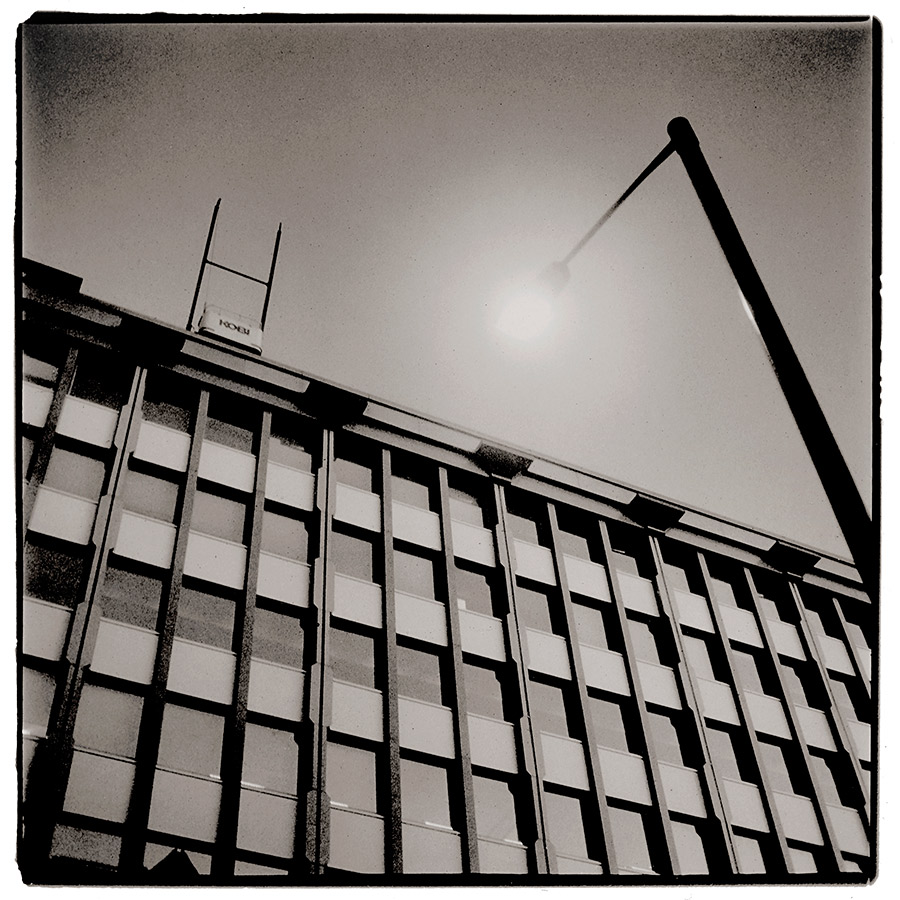
A typical print on Process Lith paper, shot and printed in the 1990s. London 1995, Rolleiflex 2.8E, Ilford HP5 Plus. Photo: Mike Crawford
Digital papers
Naturally, the shop saw a rapid change in the market from analogue to digital, and while so many papers and films were lost, they have continued to stock all the major analogue brands available to the UK. While Ilford is the market leader for black & white, Process Supplies also sells (and is the main British distributer of) the Czech brand Foma. In addition, the firm has a large range of digital papers including Hahnemuehle, Fotospeed and Permajet. The ability to sell online through its website has also increased its client base to the rest of the country and beyond.
Although digital is a large part of their turnover, Paul assured me that sales of analogue are healthy. ‘In the past few years, it has really come back. Half of the college darkrooms were shut down, but now they’re all opening up again. We also sell a fair amount online, though mostly within the UK.’ Neil agreed adding, ‘We are selling a lot of film to photographic agencies specialising in fashion, mostly medium format Kodak Portra 400.
We can’t get enough of it! Our client base is still predominantly professional photographers in the shop, while online we are selling to a lot of hobbyists and enthusiasts which is a very good balance. Most of the big name photographers in London know us, and again our location helps. We’ve supplied big names such as Bailey, Lord Snowdon, Don McCullin and many others.’
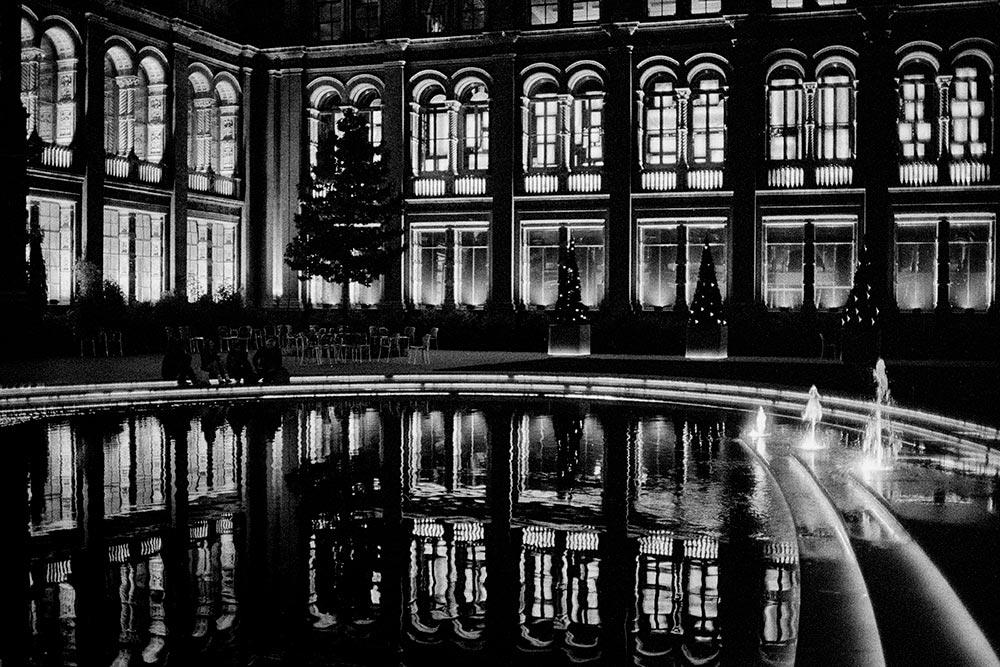
Printed on Foma Variant 111, a classic neutral toned black & white paper. Process Supplies distributes a range of Foma products, including black & white papers, films and chemicals. V&A Museum, London 2012, Konica Hexar, Ilford Delta 3200. Photo: Mike Crawford
While they stock a large variety of products outside of papers, film and chemistry, archival storage has become a really important range over the past few years. ‘We’ve been selling a lot of presentation, display and portfolio boxes, archival polyester sleeves, including our own branded product, and Print File negative sleeves. Especially during lockdown when everyone seemed to be getting their archive together.’
Paul concluded that they are quite an unique company, and from my personal experience, one that has supported the community of photographic printers, whether black & white, colour or digital. Not only in keeping us supplied with our materials, but also in previous years, sponsoring events and meetings for us to get together. ‘I think we give very good customer service,’ agreed Neil. ‘We talk a lot to our customers and always try to help. If there’s something in particular we don’t stock, instead of just saying no, we’ll make a few phone calls and if we find someone who can supply it to us, we’ll then be able to get it for the customer.’
Process Lith Paper
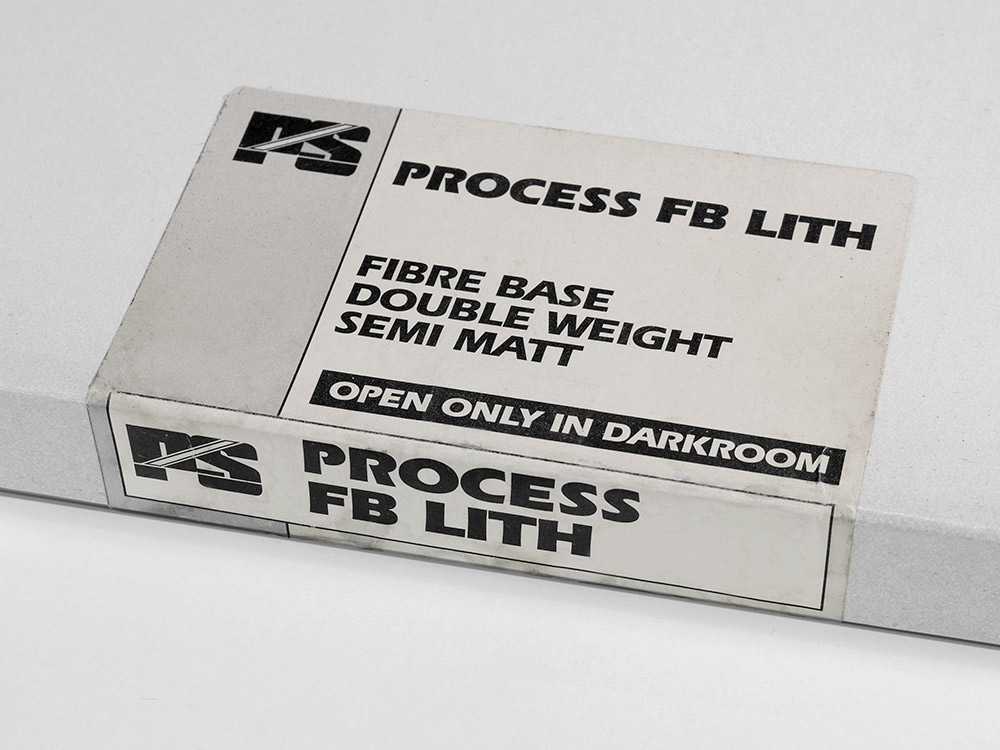
Process Lith paper, which came out in the early 1990s, was a revelation for many photographers and printers. Processed conventionally, it was a high quality warm tone paper, but in diluted lith developer it was wonderful paper for this characteristic process – giving harsh black shadows, warm mid-tones and bright highlights. By then, Kodak graphic arts lith materials had mostly been discontinued, and while several black & white papers such as Oriental Seagull produced excellent prints with this technique, Process Lith had its own individuality. It is much missed and perhaps it is time to finally use my last remaining sheets!
1920s vintage
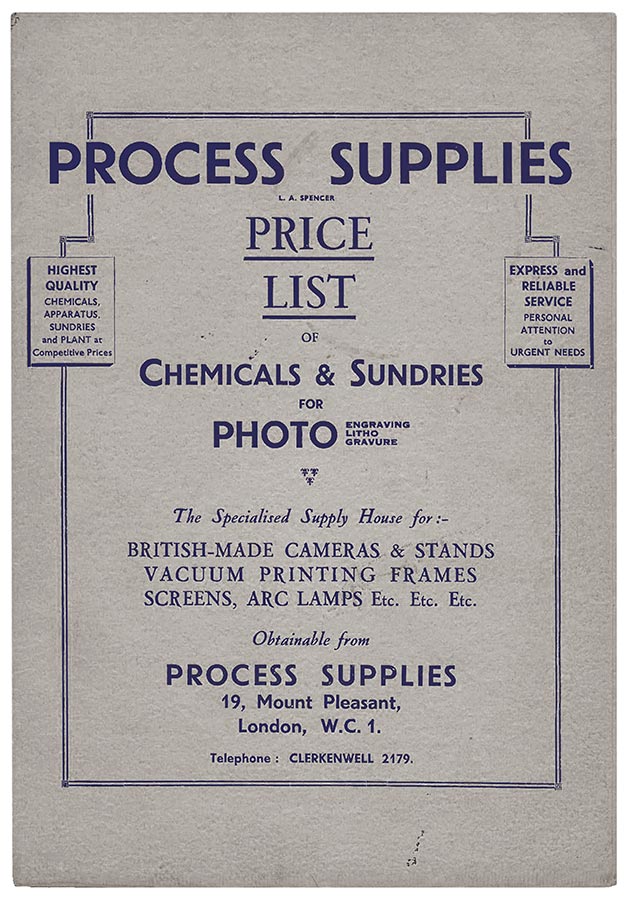
While the shop is in the same location, and even the telephone number ends the same, this price list from the late 1920s shows a very different range of products used by the printing industry to create plates for the reproduction of photographs in printed ink. Among the listings for Collodion, Hypo Crystals, Photo Transfer Inks, Silver Nitrate and Caustic Soda is the curiously named Dragon’s Blood. Instead of being an ingredient for Alchemy (Clerkenwell has such legends), it is in fact a bright red plant resin used in photo engraving as a resist to protect unused parts of the printing plate when etched in acid.
For more information about Process Supplies, visit processuk.net
Further reading:
The Royal Photographic Society: a prominent heritage of photography for all
Ilford Film: over 130 years of film photography
Edward Reeves Studio: inside the world’s oldest photographic studio

